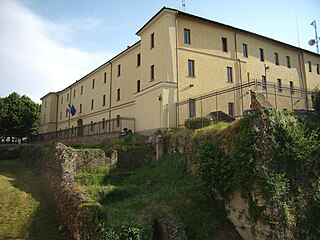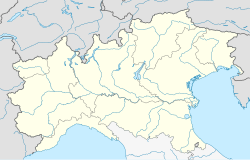
The Rocca Borromeo di Angera, or Rocca d'Angera, also called Borromeo Castle, is a rocca on a hilltop above the town of Angera in the Province of Varese on the southern shores of Lago Maggiore. It has medieval origins and initially belonged to the Milanese archbishop. It passed then to the Visconti of Milan and later to the Borromeos, who are still the owners.

The Visconti Castle of Pagazzano is a moated, late-medieval castle located in Pagazzano, a town in the Province of Bergamo in the Italian region of Lombardy. The castle in the current form was probably erected between 1450 and 1475, at the initiative of the Visconti di Brignano transforming the previous 14th-century quadrangular fortification with a surrounding moat.

The Visconti Castle in Pandino is a 14th-century castle located in the center of the town of Pandino, province of Cremona, region of Lombardy, Italy. It was built by Bernabò Visconti and his wife, Beatrice Regina della Scala, between 1355 and 1361. Today it essentially retains its original forms.

The Visconti Castle of Trezzo was a mediaeval castle built between 1370 and 1377 by Bernabò Visconti, Lord of Milan, at Trezzo sull’Adda, Lombardy, Northern Italy. It included a massive tower, 42-meter high, and a fortified bridge on the Adda river on a single arch with a record 72-meter span.

The Mirabello Castle lies in what was once the Parco Visconteo, near Mirabello di Pavia. Between the 14th and 16th centuries, it was the seat of the Captain of the Park, the authority administering the Parco Visconteo on behalf of the Visconti and Sforza families. Only a wing of the original castle has survived.

The Visconti Castle, or Castello Visconteo, is a castle in the town of Cusago near Milan, Lombardy, Northern Italy. It was built in the 14th century by Bernabò Visconti and used as a hunting lodge by him and other Visconti family members. The castle underwent significant changes in the Renaissance period; today, it is in neglected conditions.

The Visconti Castle of Abbiategrasso is a medieval castle in Abbiategrasso, Lombardy, northern Italy. It was among the first Visconti castles built according to their typical quadrangular layout. In the 14th and 15th centuries, it was one of the preferred residences of the duchesses of Milan of the Visconti and Sforza houses. Today, the castle's surviving part serves as the seat of the municipality of Abbiategrasso.

The Visconti Castle of Binasco is a mediaeval castle located in Binasco, Metropolitan City of Milan, Lombardy, Northern Italy. It is famous for having been the prison and execution place of Beatrice di Tenda, arrested and there sentenced to death for adultery in 1418. Today it is the seat of the Municipality of Binasco.

The Visconti Castle of Massino is a medieval castle located on the Vergante hills in the municipality of Massino Visconti, Province of Novara, Piedmont, northern Italy. Since the 12th century it has been a possession and one of the preferred residences of the Visconti of Milan. At that time it was frequented by the family ancestor of the lords and dukes of Milan. Afterwards its property was transferred to other collateral branches of the lineage, from the initial Visconti di Massino to the current Visconti di San Vito.

The Visconti Castle of Crenna is a castle of mediaeval origin located in Crenna, frazione of Gallarate, Lombardy, Northern Italy. It is linked to the fame of Lodrisio Visconti, who raised against and then reconciled with the members of the family of his cousin Matteo Visconti, Lord of Milan. In the 14th century, the castle underwent expansion and destruction according to the alternative fortunes of Lodrisio.

The Visconti Castle or Castello Visconteo of Cassano is a castle of medieval origin in Cassano d'Adda, Lombardy, Northern Italy. It received the current form in the 14th century, when Bernabò Visconti, lord of Milan, enlarged the existing fortification as part of a defensive system of the Visconti dominions on the Adda river. At the end of the 20th century, after a period of abandonment, it was restored and transformed into a hotel.

The Visconti Castle of Lodi is a historical building in Lodi, Lombardy, northern Italy. As it appears today, it is the result of transformations made on a Middle Age castle founded in the 12th century by Frederick Barbarossa. Its name derives from the Visconti family, lords and dukes of Milan, who in the 13th and 14th centuries took possession of and then rebuilt the original fortification.

The Visconti Castle of Fagnano is a castle located in Fagnano Olona, Lombardy, northern Italy. It lies at the border between the town of Fagnano and the Olona valley.

The Visconti Castle of Legnano is a mediaeval castle, located south of the city of Legnano, Metropolitan City of Milan, Lombardy, northern Italy. It lies on a small island formed by the Olona river. Since the 13th century, it is also known as the castle of San Giorgio.

The Visconti Castle of Voghera is a Middle Age castle in Voghera, Lombardy, Northern Italy. It was built in the 14th century by the Visconti, lords and dukes of Milan.

The Visconti Castle of Jerago is a castle of Middle Age origin located in Jerago, Lombardy, Northern Italy. Having been a property of members of the Visconti house between the 13th and 18th centuries, it retains still today their memory in its name.

The Visconti Castle of Vogogna is a medieval stone-made castle in Vogogna, Piedmont, Northern Italy. It was built in the 14th century by the Visconti, lords and dukes of Milan.

The Visconti-Sforza Castle or Sforza Castle of Galliate is a medieval castle in Galliate, Piedmont, Northern Italy. It was erected in the 15th century by the Sforza, dukes of Milan, on a previous fortification built by their progenitors Visconti.

The Visconti Castle of Pavia is a medieval castle in Pavia, Lombardy, Northern Italy. It was built after 1360 in a few years by Galeazzo II Visconti, Lord of Milan, and used as a sovereign residence by him and his son Gian Galeazzo, first duke of Milan. Its wide dimensions induced Petrarch, who visited Pavia in the fall of 1365, to call it "an enormous palace in the citadel, a truly remarkable and costly structure". Adjacent to the castle, the Visconti created a vast walled park that reached the Certosa di Pavia, a Carthusian monastery founded in 1396 by the Visconti as well and located about 7 kilometres (4.3 mi) to the north.

The Visconti Rocca of Romano is a rocca in Romano di Lombardia, Bergamo, Lombardy in Northern Italy. It was built in the 13th century and expanded in the 14th and 15th centuries by the Visconti and Colleoni families.























